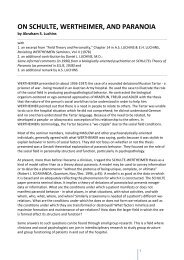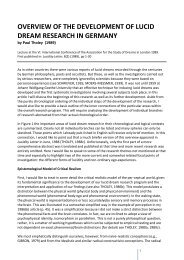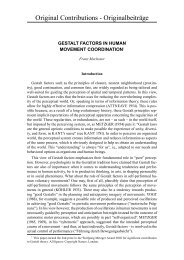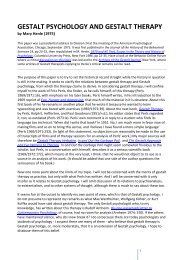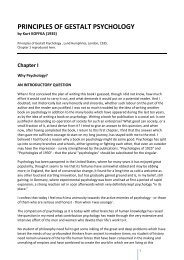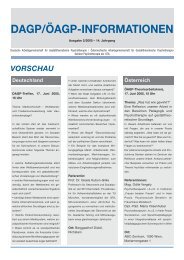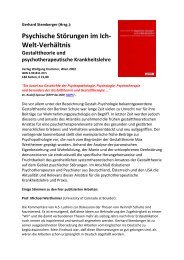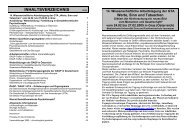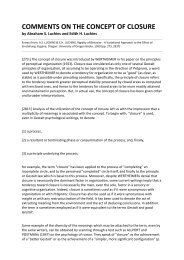pdf-Download - Society for Gestalt Theory and its Applications (GTA)
pdf-Download - Society for Gestalt Theory and its Applications (GTA)
pdf-Download - Society for Gestalt Theory and its Applications (GTA)
Create successful ePaper yourself
Turn your PDF publications into a flip-book with our unique Google optimized e-Paper software.
fear; the fear of falling; agrophobia - no place to hide - evolution has given us the fear of being cut<br />
off from the tribe, cut off from com<strong>for</strong>t; the social fear of strangers - a new face not in your tribe<br />
may be a threat. People have a need to be connected in a tribe, a family, a group, a "we."<br />
My own theory of paranoia would lean towards the evolutionary explanation. "If you don't know<br />
what's going on, it's safer to think that it involves you than to ignore it." You are walking in a<br />
wilderness 6 million years ago - a branch breaks - do you think it might mean that there is a tiger<br />
planning to jump on you or do you think, "Could it just be the wind?" It probably is to your<br />
advantage to have the first view, the "fall back" position, <strong>and</strong> turn to the alternative view when<br />
you know more about what is going on.<br />
When people don't know or trust what's going on, paranoia may occur. They probably fall back to<br />
a more familiar situation. For example, when the computer jams, you may think it means, "O.K..<br />
Watch out. You better watch out. It probably has to do with something you did."<br />
3. There is some support <strong>for</strong> this view. In experiments with hallucinogenics, students start to show<br />
paranoia when they stop knowing what is really going on, i.e., this is an experiment, that is an MD,<br />
I'm being paid to do this, etc. The same explanation probably relates to the increased paranoia<br />
seen in people who are deaf, new immigrants, after cataract surgery when visual images are<br />
interfered with, etc., etc. - all situations in which there is a breakdown in the usual ability to "know<br />
what is going on."<br />
4. Obviously, one could say that in all the situations discussed in 3, there is a reduction in "weness,"<br />
but I don't believe that is adds anything, <strong>and</strong> is rather too narrow. There is a breakdown in<br />
knowing what's going on. For example, I was walking past a parked car one day <strong>and</strong> the windshield<br />
wipers moved. I thought "Did I bang something, is there a light beam that I passed through?" I<br />
walked back to inspect it <strong>and</strong> they moved again. Then I realized the car had been turned off with<br />
the windshield wipers on automatic. But in the presence of a new situation that I didn't<br />
underst<strong>and</strong>, my first impulse was to be self-referential.<br />
Among biologically-oriented psychiatrists concerned with paranoia or schizophrenia, currently the<br />
emphasis is on neurotransmitters <strong>and</strong> neurochemistry. They may speculate about why patients do<br />
this or that action, but they are usually more concerned with why patients have obsessions than<br />
with the particular obsessions. Neurotransmission drugs <strong>and</strong> their effects, e.g., on dopamine, do<br />
not have to do with treatment of specific problems or actions. Why do patients repeatedly wash<br />
their h<strong>and</strong>s, check the door or the stove, or have ideas of reference of persecution? More<br />
discussion is needed of the content as well as of the function <strong>and</strong> purpose of paranoia in specific<br />
cases.*<br />
*Remark added by A.S. Luchins:<br />
With the drug approach, is there no place <strong>for</strong> psychotherapy to help the patient construct a livable<br />
world <strong>and</strong> take care of his everyday problems in the social field? My experiences indicate that<br />
drugs do not obviate psychosocial intervention which, moreover, can have the added dividend of<br />
helping the patient to comply with his drug regime. It is noteworthy that the biologically-oriented<br />
psychiatrist whose views were cited above believes that there should be more concern with the<br />
specific content of the paranoia.<br />
5



